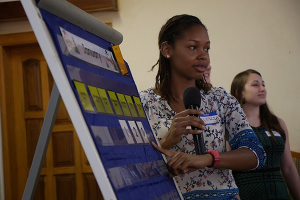 En route to Sunyani for our Professional Development Retreat weekend, we made a few stops and learned some more about Ghanaian culture and history. First we stopped to see some coffins on the side of the road. Sounds bizarre right?! Well not in Ghana! In Ghana, funerals are a celebration and the coffins reflect that! For example, if a man spends his life as a priest he may be buried in a coffin that is shaped as a bible, or if he spends his life as a farmer he may be buried in a coffin that looks like a piece of corn. We were able to see a few examples of such coffins and it really was a cool insight into the Ghanaian culture. Then we stopped at Ancestral River Park which is where the slaves took their last bath before they were moved to the slave forts and then later sold. It was so moving to see this place that has now become a museum.
En route to Sunyani for our Professional Development Retreat weekend, we made a few stops and learned some more about Ghanaian culture and history. First we stopped to see some coffins on the side of the road. Sounds bizarre right?! Well not in Ghana! In Ghana, funerals are a celebration and the coffins reflect that! For example, if a man spends his life as a priest he may be buried in a coffin that is shaped as a bible, or if he spends his life as a farmer he may be buried in a coffin that looks like a piece of corn. We were able to see a few examples of such coffins and it really was a cool insight into the Ghanaian culture. Then we stopped at Ancestral River Park which is where the slaves took their last bath before they were moved to the slave forts and then later sold. It was so moving to see this place that has now become a museum.
Once we arrived at the hotel for the retreat, after a traffic-filled 10 hour bus ride, we were met by about 60 special education teachers who had traveled hours from all over Ghana to spend the weekend with us. We kicked off the weekend with an ice breaker to get to know each other- so much fun was had by all! The first day of the retreat was a day of true collaboration! The second day was an exciting day of sharing, teaching and learning from each other. The retreat covered many Augmentative and Alternative Communication approaches that will be beneficial for many of the teachers and professionals in Ghana. It was amazing how much we as students also learned from the teachers and how much they learned from each other.
Many AAC approaches were reviewed from previous years including the AAC Market Cards, Narrative Social Stories, and Communication Passports. A few new approaches were also introduced: the Five-Finger Story Retell, Talking Mats, and Joint Action Routines. The special education teachers made fabulous, passionate presentations! Teachers shared how they use AAC approaches in their classroom, as well as their challenges.
One of the teachers, Mary Osei, talked about how one of her students went missing after taking the wrong way home. Fortunately, the student had a Communication Passport that denoted emergency information. The student had limited speech, so this was particularly useful. Many teachers also shared how they were implementing vocational training. Students who may have been previously labeled as incapable were making holiday cards, paper beads, and even fashionable bags. What great examples of how alternative communication and skills training can make such a significant impact!
Keep reading for more on the rest of the retreat!
Thanks to Rebecca McDaniels for the post

![[feed link]](/wp-content/plugins/rss-just-better/rss-cube.gif)